A Late Quartet (2012) and a final farewell to Philip Seymour Hoffman (part 5)
“Did you love me, or was I just convenient?”
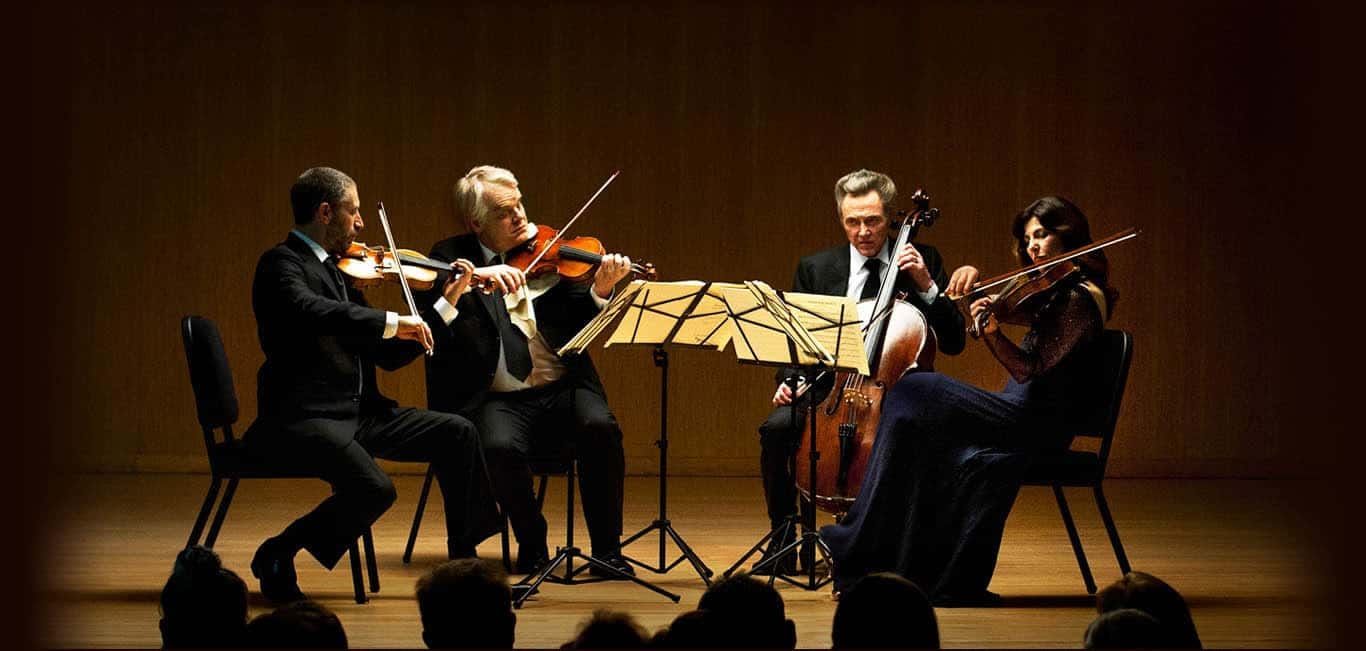
From the pleasingly traditional and somewhat old school RKO Pictures logo we dissolve to a single static camera focussing on a stage containing four green chairs for the world renowned Fugue String Quartet who as a door opens to the side of the stage, enter one by one and namely “Daniel Lerner” (Mark Ivanir) playing violin in seat one, “Robert Gelbart” (Philip Seymour Hoffman) playing violin in seat two, “Juliette Gelbart” (Catherine Keener) playing viola and “Peter Mitchell” (Christopher Walken) playing the cello. Bowing for the audience and taking their respective seats, we cut first to a pensive and seemingly worried Peter looking at Daniel, then to a smiling Juliette looking at Peter, Robert casting a one-eyed look of disdain at Daniel and lastly Daniel himself, looking down, lost and worried.
Fade to Black and “A Late Quartet” and shot from above we see the opening of a violin case as the opening credits continue and the rest of the film’s “Players” are introduced. We cut to a wider shot of Daniel preparing to practice Beethoven’s Opus 131 alone as we now see a close-up shot of his music book and numerous pencil notations of where he and his three partners all play lead or distinctive parts and as the practice begins, so too does the film’s opening narration:
“Time present and time past are both perhaps present in time future”
We cut to Robert jogging on a bitterly cold looking and snow bound day.
“And time future contained in the past. If all time is eternally present, all time is unredeemable”
We now cut to Juliette carrying a vase of flowers into a large, opulent looking room, a sitting room perhaps, or a room that we will soon discover doubles as a practice room for the Fugue String Quartet.
“Or say that the end precedes the beginning, and the end and the beginning were always there, before the beginning and after the end. And all is always now”
Now we cut to Peter speaking to a room full of eager music students and from a narration (though this still continues) we see that this has been and continues to be, both a speech to inspire his students, and a reading from T.S. Eliot’s “Four Quartets”.
“That’s T.S. Eliot’s take on Beethoven’s late quartets. Today, we think about what Eliot might have meant. We begin with Beethoven’s Opus 131, said to be his personal favourite. It has seven movements, at a time when four was standard”
We cut back to Juliette preparing the practice area for the quartet, her flowers centre of the frame.
“And they’re all connected. You’re not allowed to stop between movements. No resting. No tuning. Beethoven insists it be played attacca, without pause”
We cut back to Robert jogging.
“Was he maybe trying to point out some cohesion, some unity between the random acts of life? Or being deaf, alone, and sensing the end, he might have felt he had no time to pause, to take a breath”
We cut to Daniel planing and perfecting the beginnings of a new violin.
“For us, it means that playing for so long without pause, our instruments must in time go out of tune, each in its own different way. It’s a mess. What are we supposed to do? Stop? Or, struggle, to continuously adjust to each other up to the end, even if we are out of tune? I don’t know.
Let’s find out”
With the opening narration over we cut to Robert if not sleeping certainly napping in front of his computer as his telephone begins to ring. Tour dates to Hong Kong and Shanghai are noted in a large diary although he stresses he has to agree these formally with the group and we cut first to an overhead shot of an unspecified city twinkling in the lights of an early evening before we dissolve into a toast given by Peter to his recently deceased wife, his friends in the quartet, for their first playing together since a seasonal break and “for the music, the quartet, us together, have gotten me through it”. As they walk towards their respective chairs, Peter also toasts their 25 year anniversary as a quartet as well as the progress of Robert and Juliette’s daughter Alexandra as a budding violinist and requests Daniel listen to her play sometime and offer some guidance, a little direction, some encouragement perhaps, and Daniel is more than happy to agree. With an immediate close-up on Robert he suggests, strongly, that after 25 years maybe they should change up their routine and play Beethoven “by heart”. Peter agrees almost immediately whilst Daniel is vehemently and equally immediately against the idea and after a pause, Juliette agrees with him and against her husband’s idea. Smiling through gritted teeth, Robert concedes and “tie goes to the conservatives I guess”. After each player tunes their instrument Daniel, as violin number one, begins the practice session before Robert and then Juliette in turn join in. The session has started well but as Peter joins in on the cello, he’s almost immediately badly out of tune. “I must still be on vacation time” he insists with a worried laugh and agreeing to return to the beginning, Daniel starts over, Robert and Juliette slowly join in, but Peter begins out of time and out of tune and to worried looks, if smiles all around the practice area, the quartet agree to reschedule their next practice until the following week.
A final cut in the opening ten minutes of the film sees Peter performing simple hand movements and the opening and closing of his fists inside a doctor’s office before struggling to raise himself from a chair, walks gingerly to and back from the door on the doctor’s request. On his return, the doctor suggests a simple blood test, a MRI scan and a return in a week to discuss the results of both, however Peter is clearly anxious for a diagnosis and opinion “even if you’re not certain”. He presses the doctor still further and “It’s OK. We’ve known each other a long time”. After a pause and a comforting smile, the doctor confirms, in her early opinion and based on both the simple tests they’ve just conducted and the body ailments Peter has described to her, that he’s likely experiencing the early symptoms of Parkinson’s disease. She still wishes to carry out a blood test and a MRI scan to rule out more severe adverse possibilities, but at this early stage she’s confident that her diagnosis will stand and Peter is suffering with Parkinson’s.
Unable to fully comprehend the response from his doctor, Peter can only utter “wow” as the scene comes to a close…
Directed by Yaron Zilberman in his debut feature length film and eight years after his first documentary film Watermarks, A Late Quartet is far from the four handed affair as described above, a beautifully surprising film I simply didn’t account for as I watched for the first time and far, far more than a story of a string quartet of “players” losing themselves in their passion and love for the music of Beethoven. Christopher Walken carries the story line of his character’s debilitating disease with a grace and purpose you’d expect from a master of his craft and whilst my cinematic love for Philip Seymour Hoffman and Catherine Keener is well known to those who’ve read my previous spoiler free film reviews, the fourth in our quartet here Mark Ivanir or “Mr Perfection” is arguably the star of a very fine show indeed. Imogen Poots is fantastic as Robert and Juliette’s supremely talented violin playing daughter “Alexandra”, Liraz Charhi provides valuable narrative support as “Pilar”, Wallace Shawn too as “Gideon” and bringing a dash of real life to the creative magic of film, Nina Lee (of the Brentano String Quartet who provided the music for the film) plays herself.
There’s a gritty realism here in A Late Quartet of professional musicians, the life they lead, a life they leave behind, and a burning desire to be the very best there is, both individually and as part of a group. There’s an obvious air of tension from the film’s earliest frames, but the beauty I saw was that it wasn’t overplayed too early and when it comes it explodes furiously in the hands of Philip Seymour Hoffman but, crucially and pleasingly for the film, after the story had turned away from the obviously signposted drama, and via a quite unexpected about turn.
A pleasingly very good film.
Thanks for reading. I hope this message in a bottle in The Matrix finds you well, prospering, and the right way up in an upside down world.
Whilst you’re here I may as well brag about the release of my trilogy of recently self-published books. Beautiful covers eh! As the title(s) would suggest, this is my life at the movies or at least from 1980 to 2024, and in volume 1 you’ll find 80 spoiler free appraisals of movies from debut filmmakers, 91 of the very best films appraised with love and absent of spoilers from 1990–2024 in volume 2, and in volume 3 you’ll find career “specials” on Paul Thomas Anderson and Quentin Tarantino together with the very best of the rest and another 87 spoiler free film reviews from 2001–2024.
All available in hardback and paperback and here are some handy links:
"A Life at the Movies Vol.1" - link to Amazon
"A Life at the Movies Vol.2" - link to Amazon
"A Life at the Movies Vol.3" - link to Amazon





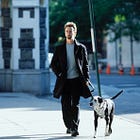
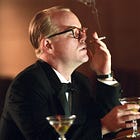
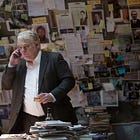
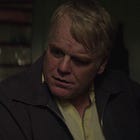

"...the pleasingly traditional and somewhat old school RKO Pictures logo..." The beeping radio tower or the static lightning bolt?